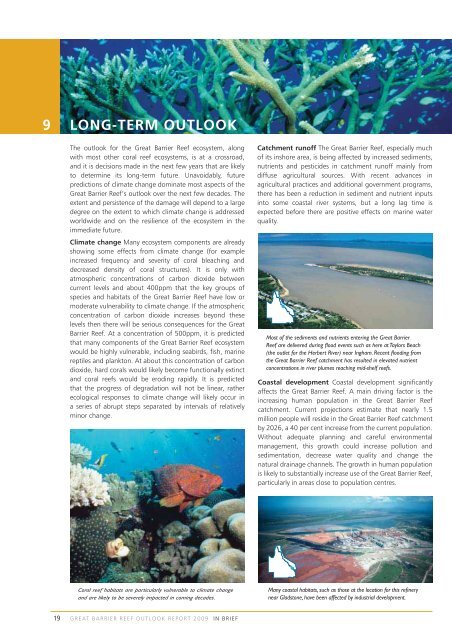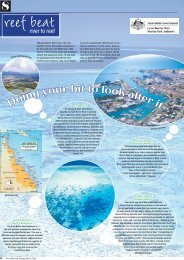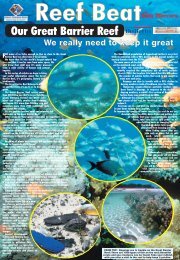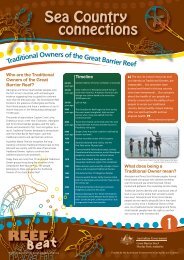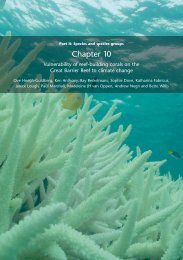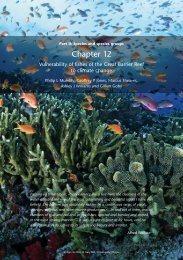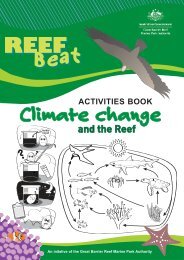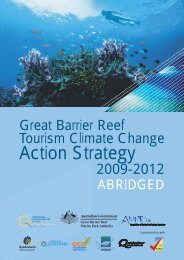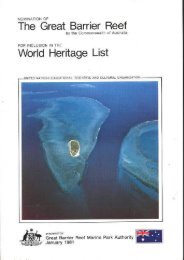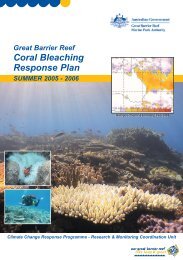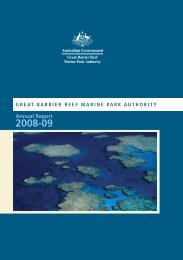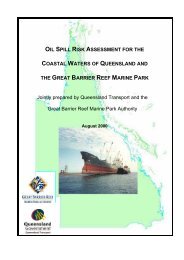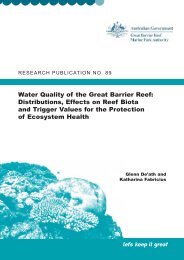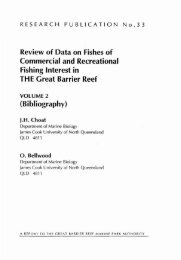9LONG-TERM OUTLOOKThe outlook for the <strong>Great</strong> <strong>Barrier</strong> <strong>Reef</strong> ecosystem, alongwith most other coral reef ecosystems, is at a crossroad,and it is decisions made in the next few years that are likelyto determine its long-term future. Unavoidably, futurepredictions of climate change dominate most aspects of the<strong>Great</strong> <strong>Barrier</strong> <strong>Reef</strong>’s outlook over the next few decades. Theextent and persistence of the damage will depend to a largedegree on the extent to which climate change is addressedworldwide and on the resilience of the ecosystem in theimmediate future.Climate change Many ecosystem components are alreadyshowing some effects from climate change (for exampleincreased frequency and severity of coral bleaching anddecreased density of coral structures). It is only withatmospheric concentrations of carbon dioxide betweencurrent levels and about 400ppm that the key groups ofspecies and habitats of the <strong>Great</strong> <strong>Barrier</strong> <strong>Reef</strong> have low ormoderate vulnerability to climate change. If the atmosphericconcentration of carbon dioxide increases beyond theselevels then there will be serious consequences for the <strong>Great</strong><strong>Barrier</strong> <strong>Reef</strong>. At a concentration of 500ppm, it is predictedthat many components of the <strong>Great</strong> <strong>Barrier</strong> <strong>Reef</strong> ecosystemwould be highly vulnerable, including seabirds, fish, marinereptiles and plankton. At about this concentration of carbondioxide, hard corals would likely become functionally extinctand coral reefs would be eroding rapidly. It is predictedthat the progress of degradation will not be linear, ratherecological responses to climate change will likely occur ina series of abrupt steps separated by intervals of relativelyminor change.Catchment runoff The <strong>Great</strong> <strong>Barrier</strong> <strong>Reef</strong>, especially muchof its inshore area, is being affected by increased sediments,nutrients and pesticides in catchment runoff mainly fromdiffuse agricultural sources. With recent advances inagricultural practices and additional government programs,there has been a reduction in sediment and nutrient inputsinto some coastal river systems, but a long lag time isexpected before there are positive effects on marine waterquality.Most of the sediments and nutrients entering the <strong>Great</strong> <strong>Barrier</strong><strong>Reef</strong> are delivered during ood events such as here at Taylors Beach(the outlet for the Herbert River) near <strong>In</strong>gham. Recent ooding fromthe <strong>Great</strong> <strong>Barrier</strong> <strong>Reef</strong> catchment has resulted in elevated nutrientconcentrations in river plumes reaching mid-shelf reefs.Coastal development Coastal development significantlyaffects the <strong>Great</strong> <strong>Barrier</strong> <strong>Reef</strong>. A main driving factor is theincreasing human population in the <strong>Great</strong> <strong>Barrier</strong> <strong>Reef</strong>catchment. Current projections estimate that nearly 1.5million people will reside in the <strong>Great</strong> <strong>Barrier</strong> <strong>Reef</strong> catchmentby 2026, a 40 per cent increase from the current population.Without adequate planning and careful environmentalmanagement, this growth could increase pollution andsedimentation, decrease water quality and change thenatural drainage channels. The growth in human populationis likely to substantially increase use of the <strong>Great</strong> <strong>Barrier</strong> <strong>Reef</strong>,particularly in areas close to population centres.Coral reef habitats are particularly vulnerable to climate changeand are likely to be severely impacted in coming decades.Many coastal habitats, such as those at the location for this re nerynear Gladstone, have been affected by industrial development.19GREAT BARRIER REEF OUTLOOK REPORT <strong>2009</strong> IN BRIEF
Direct use – extractive The lack of information aboutsome target species, the fate of non-retained catch and theincidental catch of species of conservation concern meansthat the ecosystem level impacts of fishing are not wellunderstood. Progress towards application of best practicemanagement across all fisheries is being made, but notrapidly. Illegal fishing pressure, by foreign or domestic fishers,can work against management arrangements to protect theecosystem. Changes in global fisheries production patternsare likely to increase demand for wild caught seafood anddrive a diversification in the species targeted and the areasfished and increase the likelihood of illegal fishing.The <strong>Great</strong> <strong>Barrier</strong> <strong>Reef</strong> Marine Park is considered by manyaround the world as a leading example of world’s best practicemanagement. Building on these existing arrangements,several major management initiatives are underway to furtheraddress the key threats to the <strong>Great</strong> <strong>Barrier</strong> <strong>Reef</strong> ecosystem.These actions and the degree to which they are effectivelyimplemented will strongly influence the <strong>Great</strong> <strong>Barrier</strong> <strong>Reef</strong>’sresilience in the future:The continued effectiveness of the Zoning Planrelies in part on the continued enforcement of zoningarrangements and ensuring reef users are aware of thePlan and its provisions.Effective implementation of actions under <strong>Reef</strong> WaterQuality Protection Plan and the <strong>Reef</strong> Rescueinitiative will contribute to improvement in waterquality; however, these improvements are likely to takemany years to be translated into measurable changes inecosystem function.To ensure that Queensland’s system for planning anddevelopment is responsive to its rapidly changingneeds, the Queensland Government has implementeda planning reform initiative, the culmination of anextensive review of planning and development inQueensland.<strong>In</strong> 2008, the Queensland Government committed toimplementing revised management arrangements forthe East Coast <strong>In</strong>shore Finfish Fishery. Measureswere established to better manage the potentialincreasing recreational fishing pressure resulting frompopulation growth. The management arrangementsalso focus on the commercial large mesh (gill) netfishery.As part of the <strong>Reef</strong> Rescue Plan, $10 million has beenallocated to the development of land and seacountry <strong>In</strong>digenous partnerships to strengthencommunications between local communities, managersand stakeholders; build a better understanding ofTraditional Owner issues relating to the management ofthe <strong>Great</strong> <strong>Barrier</strong> <strong>Reef</strong>; and improve the sustainability ofthe traditional use of marine resources, especially whereit is focused on species of conservation concern.The focus of the <strong>Great</strong> <strong>Barrier</strong> <strong>Reef</strong> Climate ChangeAction Plan, 2007-2012 is to increase knowledgeabout the implications of climate change for both the<strong>Great</strong> <strong>Barrier</strong> <strong>Reef</strong> and the people who depend uponit, and to develop and support strategies to fosteradaptation and minimise impacts through improvingand maintaining resilience.Variations in ecosystem response to the threats will occuralong the length and width of the <strong>Great</strong> <strong>Barrier</strong> <strong>Reef</strong>. Suchregional differences are now observable and are likely tobecome more obvious over time. Generally, the areas at mostsignificant risk are those closest to already developed areasthat have already deteriorated more because of catchmentrunoff and coastal development. For some of the threatsrelated to climate change, southern areas of the <strong>Great</strong><strong>Barrier</strong> <strong>Reef</strong> Region, especially inshore, are predicted to bethe most vulnerable.Ultimately, if changes to the world’s climate become toosevere, no management actions will be able to climate-proofthe <strong>Great</strong> <strong>Barrier</strong> <strong>Reef</strong> ecosystem.Assessmentcriteria<strong>Outlook</strong> forthe <strong>Great</strong><strong>Barrier</strong> <strong>Reef</strong>ecosystemSummaryDespite the introduction of significant protection and management initiatives, theoverall outlook for the <strong>Great</strong> <strong>Barrier</strong> <strong>Reef</strong> is poor. Even with the recent initiatives toimprove resilience, catastrophic damage to the <strong>Great</strong> <strong>Barrier</strong> <strong>Reef</strong> ecosystem may notbe averted. Building the resilience of the <strong>Great</strong> <strong>Barrier</strong> <strong>Reef</strong> ecosystem will give it thebest chance of adapting to and recovering from the serious threats ahead, especiallyfrom climate change. Given the strong management of the <strong>Great</strong> <strong>Barrier</strong> <strong>Reef</strong>, it islikely that the ecosystem will survive better than most other reef ecosystems aroundthe world.VerygoodAssessment GradeGoodPoorVerypoorAs descendants, we have a lifelong spiritual and physical connection to the land and sea - every living thing is connectedthrough the circle of life. We have a lifelong responsibility to our ancestors to care for land and sea country.Woppaburra Aspirational Statementas part of the Woppaburra Traditional Use of Marine Resource AgreementLONG-TERM OUTLOOK20


